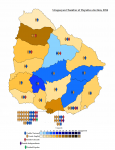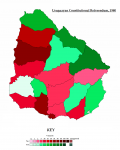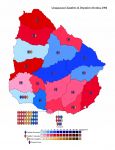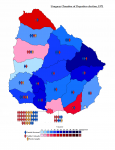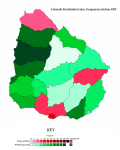- Location
- Tamaki Makaurau
There were some hopes, in the first years of the Alliance, that it would grow into a unitary party of the Left - but this was not to be. Largely, of course, because of the jealous loyalty of each party (the Greens, NewLabour, Mana Motuhake, the Democrats for Social Credit and the Liberals) to its principles, but also because of the personal disputes between the leaders.
This was bad enough when Jim Anderton was running as much as he could from his own office, and ignoring the grassroots. It became almost intolerable when Winston Peters was recruited to lead the Liberals, and the Alliance, in 1992. Anderton, despite his favour of the idea, was put out by how quickly the rank and file turned to a new saviour, while the more liberal-left members of the NLP and the Greens grew weary of Peters' conservative ideals and the constant demands for contributions to campaign funds. Not that the funds were misused: the Tauranga by-election saw Winston fight off challenges from both major parties in a stonking victory.
Going into the 1993 election, there was a genuine feeling that the Alliance would be setting the narrative of the next government - and a consequent niggling worry about what exactly that narrative would end up being. As it turned out, however, only a few seats were won: Sandra Lee of Mana Motuhake took Auckland Central, Jim Anderton held Wigram and was joined by NewLabour stablemates in Jill Jeffs of Albany and Tau Henare of Northern Maori, and Winston Peters' Liberals grew their ranks, winning Hobson, Kaimai, Matakana and Whangarei. Half of the upper North Island had turned to the Alliance - and specifically the Liberals.
The 1993 result was a hung Parliament, but Jim Bolger didn't have to worry, for Anderton pledged to give NewLabour's supply and confidence to National on account of their victory in the popular vote (to much gnashing of teeth within the NLP) and Winston followed suit. It was at this point that things fell apart: the Greens, having won nothing despite contributing a fair amount of the Alliance vote, felt hard-done-to and most were aggrieved that their hard work had only led to another term of National. Mana Motuhake were mightily annoyed that the Alliance had nominated NewLabour's not-so-lefty Tau Henare for Northern Maori, which had been their strongest seat - and that he had won, thus embarrassing Mat Rata. Sandra Lee was also uncomfortable with the arrangement with National. Both parties therefore abandoned the Alliance shortly after the election - the Greens in particular were confident of getting into Parliament at the first MMP election.
From this point, the Alliance was effectively dead. An increasing level of mutual distaste between Peters and Anderton was making any attempt to work together impossible between the two major parties of the remnant, and they parted ways in 1994. The Democrats stayed with NewLabour in this ugly divorce, but only until they managed to convince Tau Henare to defect to them shortly before the '96 election, and thereby felt that they had a good shot of getting into Parliament through the coat-tail rule. Henare's true logic is unknown, but it is no secret that he was uncomfortable in the liberal-left parts of NewLabour and may have been taken in by the Democrats' tales of vast funds left over from the Beetham days.
In the run-up to the election, the old parties began shedding backbenchers to the minor parties - Peter McCardle and Michael Laws swelled the ranks of the Liberals and gushed about how Winston would be the next PM until it became apparent that he was stuck in the doldrums of 10-15%. Others, who were on board with the neoliberal reforms but in danger of deselection on the new boundaries, set up the United Party to grab the centrist vote that was in fact all with Peters and not on board with the neoliberal reforms. Finally, Peter Dunne ended up as ACT's first MP, contesting the 'genuine Liberal' vote of hardcore free-marketeers and pale students. The crossbenches were getting very full indeed.
It was apparent that not all of these parties would cross the 5% threshold, so various arrangements were set up - National did not contest Dunne's seat in the hope that ACT would serve as a coalition partner, while the former Alliance parties were at least unconsumed by acrimony to the extent that they did not run electorate candidates against one another. Dunne won, Jeanette Fitzsimons of the Greens gained Coromandel, Tau Henare held Te Tai Tokerau for the Democrats (somehow), Jim Anderton held Wigram, and although the Liberals lost all their existing seats save for Peters' Tauranga and Brian Donnelly's Whangarei electorates, they also gained two Maori electorates with Rana Waitai and Tuariki Delamere. The big surprise of the night, though, was that Mana Motuhake finally pulled out the stops and took the other two Maori electorates off Labour - albeit only with Winston's endorsement.
One of Mana Motuhake's seats was an overhang, and they therefore didn't get any more seats off the List. Henare's perfidiousness, however, launched John Wright, the Democrat leader, into Parliament. The other minor parties all crossed the threshold, although the NLP only managed it on special votes. After two months of coalition negotiations, it became clear that the only option was for the Liberals and ACT to back National - a coalition which would have a bare 62 seats out of 121. This became 61 almost immediately when Awatere Huata went Independent to get a bigger expenses package, while the Liberals, frustrated at their lack of policy input, lost a couple of MPs along the way despite heavy whipping from Michael Laws - and their participation in two terms of a New Right government finally came back to bite them at the next election.
However, before 1999, the stream of defections from National's coalition partners forced Bolger (and his successor, Jenny Shipley) to acquire the support of the Christian Coalition. Which promptly split between the Christian Democrats, who were more than happy to return to the fold, and Christian Heritage, who spun their decision as a principled, Dutch-confessional-party-style otherworldliness, but seems to have been more down to the fact that their leader didn't want to be under much scrutiny in case the media found out about the child abuse thing.
Suffice to say, this was the only occasion in NZ history when 7 parties crossed the threshold.

This was bad enough when Jim Anderton was running as much as he could from his own office, and ignoring the grassroots. It became almost intolerable when Winston Peters was recruited to lead the Liberals, and the Alliance, in 1992. Anderton, despite his favour of the idea, was put out by how quickly the rank and file turned to a new saviour, while the more liberal-left members of the NLP and the Greens grew weary of Peters' conservative ideals and the constant demands for contributions to campaign funds. Not that the funds were misused: the Tauranga by-election saw Winston fight off challenges from both major parties in a stonking victory.
Going into the 1993 election, there was a genuine feeling that the Alliance would be setting the narrative of the next government - and a consequent niggling worry about what exactly that narrative would end up being. As it turned out, however, only a few seats were won: Sandra Lee of Mana Motuhake took Auckland Central, Jim Anderton held Wigram and was joined by NewLabour stablemates in Jill Jeffs of Albany and Tau Henare of Northern Maori, and Winston Peters' Liberals grew their ranks, winning Hobson, Kaimai, Matakana and Whangarei. Half of the upper North Island had turned to the Alliance - and specifically the Liberals.
The 1993 result was a hung Parliament, but Jim Bolger didn't have to worry, for Anderton pledged to give NewLabour's supply and confidence to National on account of their victory in the popular vote (to much gnashing of teeth within the NLP) and Winston followed suit. It was at this point that things fell apart: the Greens, having won nothing despite contributing a fair amount of the Alliance vote, felt hard-done-to and most were aggrieved that their hard work had only led to another term of National. Mana Motuhake were mightily annoyed that the Alliance had nominated NewLabour's not-so-lefty Tau Henare for Northern Maori, which had been their strongest seat - and that he had won, thus embarrassing Mat Rata. Sandra Lee was also uncomfortable with the arrangement with National. Both parties therefore abandoned the Alliance shortly after the election - the Greens in particular were confident of getting into Parliament at the first MMP election.
From this point, the Alliance was effectively dead. An increasing level of mutual distaste between Peters and Anderton was making any attempt to work together impossible between the two major parties of the remnant, and they parted ways in 1994. The Democrats stayed with NewLabour in this ugly divorce, but only until they managed to convince Tau Henare to defect to them shortly before the '96 election, and thereby felt that they had a good shot of getting into Parliament through the coat-tail rule. Henare's true logic is unknown, but it is no secret that he was uncomfortable in the liberal-left parts of NewLabour and may have been taken in by the Democrats' tales of vast funds left over from the Beetham days.
In the run-up to the election, the old parties began shedding backbenchers to the minor parties - Peter McCardle and Michael Laws swelled the ranks of the Liberals and gushed about how Winston would be the next PM until it became apparent that he was stuck in the doldrums of 10-15%. Others, who were on board with the neoliberal reforms but in danger of deselection on the new boundaries, set up the United Party to grab the centrist vote that was in fact all with Peters and not on board with the neoliberal reforms. Finally, Peter Dunne ended up as ACT's first MP, contesting the 'genuine Liberal' vote of hardcore free-marketeers and pale students. The crossbenches were getting very full indeed.
It was apparent that not all of these parties would cross the 5% threshold, so various arrangements were set up - National did not contest Dunne's seat in the hope that ACT would serve as a coalition partner, while the former Alliance parties were at least unconsumed by acrimony to the extent that they did not run electorate candidates against one another. Dunne won, Jeanette Fitzsimons of the Greens gained Coromandel, Tau Henare held Te Tai Tokerau for the Democrats (somehow), Jim Anderton held Wigram, and although the Liberals lost all their existing seats save for Peters' Tauranga and Brian Donnelly's Whangarei electorates, they also gained two Maori electorates with Rana Waitai and Tuariki Delamere. The big surprise of the night, though, was that Mana Motuhake finally pulled out the stops and took the other two Maori electorates off Labour - albeit only with Winston's endorsement.
One of Mana Motuhake's seats was an overhang, and they therefore didn't get any more seats off the List. Henare's perfidiousness, however, launched John Wright, the Democrat leader, into Parliament. The other minor parties all crossed the threshold, although the NLP only managed it on special votes. After two months of coalition negotiations, it became clear that the only option was for the Liberals and ACT to back National - a coalition which would have a bare 62 seats out of 121. This became 61 almost immediately when Awatere Huata went Independent to get a bigger expenses package, while the Liberals, frustrated at their lack of policy input, lost a couple of MPs along the way despite heavy whipping from Michael Laws - and their participation in two terms of a New Right government finally came back to bite them at the next election.
However, before 1999, the stream of defections from National's coalition partners forced Bolger (and his successor, Jenny Shipley) to acquire the support of the Christian Coalition. Which promptly split between the Christian Democrats, who were more than happy to return to the fold, and Christian Heritage, who spun their decision as a principled, Dutch-confessional-party-style otherworldliness, but seems to have been more down to the fact that their leader didn't want to be under much scrutiny in case the media found out about the child abuse thing.
Suffice to say, this was the only occasion in NZ history when 7 parties crossed the threshold.


